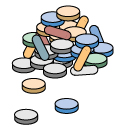
You may not know it, but there are several items commonly found around the house that are toxic to cats and dogs. Below is a brief summary of some of the most common items. For further information on toxins, please review the ASPCA website at http://www.aspca.org/pet-care/animal-poison-control or the Pet Poison Helpline website at http://www.petpoisonhelpline.com/. Both of these companies also have apps you can download to your phone now, for faster searching.
Chocolate:
Chocolate contains a substance called Theobromine, which is toxic to both dogs and cats. As little as 1oz could potentially cause health problems in your pet. Some of the potential symptoms include: vomiting, diarrhea, increased heart rates, seizures and even death.
Caffeine:
Caffeine can be found in coffee, tea, soda and energy drinks. This compound stimulates the heart and respiratory muscles and can result in cardiac collapse.
Grapes, Raisins & Onions:
Certain types of grapes and raisins have been shown to cause kidney failure in dogs when eaten in certain amounts. Other grapes species and onions contain a toxin that causes the red blood cells of dogs and cats to break down when ingested leading to anemia (low red blood cell numbers).
Common Toxic Plants:
- Lilies
- Marijuana
- Sago Palm
- Tulips/Narcissus bulbs
- Azalea/Rhododendron
- Oleander
- Castor Bean
- Cyclamen
- Kalanchoe
- Yew
- Autumn Crocus
- Amaryllis
- Chrysanthemum
- English Ivy
- Tomato Plant (unripe portions)
- Holly
- Potpourri
- Baby’s Breath
- Morning Glory
**This list is not inclusive; they’re many other plants that should be avoided for your pet’s safety. For a full list of toxic plants you can visit the ASPCA website at www.aspca.org.
Acetaminophin (aka: Tylenol):
This compound is found in many over the counter pain relievers and should never be given unless instructed by your vet. This drug is toxic to both dogs and cats in certain quantities, with cats having a very low tolerance level. Cats do not have the enzyme needed to transform the drug to its non-toxic state, therefore serious symptoms will result from just one dose and if two doses are given with 24 hours death is inevitable!
Ethylene Glycol(aka:Antifreeze)
Antifreeze has a sweet taste, which draws the animal to it. Ingestion of this compound can lead to acute renal failure and pH imbalances creating detrimental effects in the body. Signs are usually seen within 12 hours and include; an intoxicated appearance, vomiting, lethargy, frequent drinking and urination, seizures, coma and possibly death.
Metals:
Lead is the most common metal ingested. It can be found in some paints, batteries, linoleum, fish sinkers, plumbing supplies, lead pipes and shotgun pellets. Ingestion can lead to gastrointestinal and neurological problems.
Zinc is another metal that is commonly ingested. Pennies contain a high level of zinc that can cause the red blood cells to rupture causing anemia (low red blood cell numbers).
Pesticides/Insecticides:
Ingestion of these compounds even in very small quantities is a serious situation. Depending on the chemical involved lethargy, vomiting, hemorrhage, difficulty breathing, seizures, muscle twitching or even sudden death can occur. If you suspect your pet to have ingested any of these compounds, get them to the vet immediately.
Other Products to Avoid:
- Macadamia nuts
- Moldy or spoiled food
- Raw bread dough
- Garlic – same toxic results as onions
- Guatemalan Avocado
- Garbage
- Cigarettes
- Alcohol
- Household cleaning products
- Prescription drugs
What to do if you suspect your pet ingested a toxin?
- Collect any materials involved (Containers, wrappers etc) that could help your veterinarian treat the animal faster.
- Call your regular veterinarian
- If regular vet is closed you can call the Animal Emergency Clinic at (905) 576-3031, the ASPCA poison hotline 1-888-4-ANI-HELP, or the Pet Poison Helpline at 1-800-213-6680.
Note: Animals can sometimes appear normal for several hours or even days before symptoms start to appear. The sooner your animal is treated the better the chances are to help them.
If you are unsure if a substance is toxic you can see a full list of toxins on the ASPCA website at http://www.aspca.org/pet-care/animal-poison-control
The information contained within the above article is © copyrighted by it’s respective owner. From ASPCA at www.apsca.org/appcc. provided by Thickson Road Pet Hospital.

